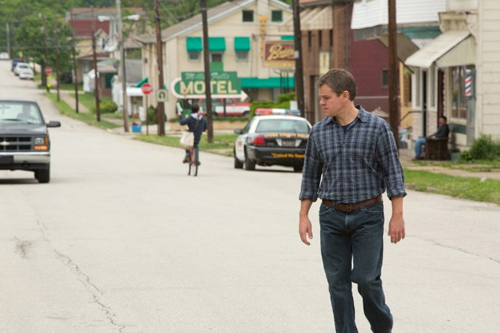Review: Promised Land

The politically charged Promised Land is a far better movie than it could have been, given that issue-oriented "message films" are sometimes little more than preachy, plot-thin polemics.
Fortunately, Gus Van Sant's drama focuses more on its plot and characters than on the issue behind the story, the natural gas extraction method known as "fracking." While no doubt a message film, it soft-pedals its politics -- and even acknowledges the issue's complexity -- while delivering an interesting story.
Promised Land is the story of Steve Butler (Matt Damon) and Sue Thomason (Frances McDormand), two energy company sales executives dispatched to the rural town of McKinley (the state isn't specified) to convince the locals to sell natural gas drilling rights to their properties. Butler and Thomason expect their job will be an easy one; McKinley has long been economically depressed, and they're offering what seems like large amounts of money to the town's ever-poorer residents.
Their job gets complicated, however, when local schoolteacher Frank Yates (Hal Holbrook) disrupts a community meeting about the gas drilling. Warning everyone of the dangers of fracking -- which involves injecting fluid into wells under high pressure to break rocks and release the natural gas trapped within them -- Yates and his supporters convince local officials to delay their decision to allow fracking in the town. Enter environmental activist Dustin Noble (John Krasinski), and things quickly grow heated as Noble wages his own anti-fracking campaign and does his best to interfere with Butler and Thomason's work.
As his stay in McKinley drags on, Butler also falls for local schoolteacher Alice (Rosemarie DeWitt). In doing so, he unwisely mixes his personal and professional lives; he's torn between his obligation to his employer and his attraction to Alice, who's mostly opposed to fracking and fearful of what a drilling disaster could do to the town.
The fracking controversy is the sort of dreary sociopolitical and economic issue that could suffocate a movie, but Promised Land's light touch and human angle keep things entertaining. The screenplay (by Krasinski and Damon, based on a story by author and McSweeney's founder Dave Eggers) is a well balanced mix of social commentary, drama, romance and comedy, a largely character-driven look at the plight of many rural Americans and the deals with the devil they often make to avoid economic ruin.
To its great credit, Promised Land doesn't reduce the story to a simplistic tale of a greedy, soulless corporation trying to dupe unsuspecting townsfolk into risking their way of life for a quick buck. It also avoids distilling the principal players to simplistic caricatures of good and evil. While clearly a cautionary tale about fracking -- we know whose side the filmmakers are on -- Promised Land takes the risk of humanizing the monster, or at least its representatives. In a less nuanced film, Butler and Thomason could be as soulless as their employer; instead, they're conflicted -- determined to do their jobs, but unexpectedly sympathetic toward the people they're supposed to be manipulating.
Conversely, the townsfolk aren't all pillars of salt-of-the-earth righteousness; some let their greed get the better of them, shrewdly try to work the company's con to their own advantage, and spend their windfalls stupidly. Promised Land also reminds us that as voracious energy consumers, we all help create the monster. Fracking wouldn't exist or be profitable if there weren't an insatiable demand for the gas it produces.
The most interesting character in Promised Land is Noble, whom Krasinski plays with a mix of nice-guy sincerity and smartassed, mocking elitism very reminiscent of Jim Halpert on The Office. (Krasinski has this persona down to a science. I respect his talents, but wonder if he can play any other kind of character. I'd like to see him as a violent sociopath or similarly, a Republican congressman.) Noble treats the controversy like a friendly battle of wits, seemingly more interested in making his opponents' lives miserable than in merely defending the environment.
McDormand is in her usual top form as Thomason, a no-nonsense corporate climber whom the film humanizes somewhat less than her partner in crime, Butler. A harried mother trying to balance the demands of a high-powered career and her high-spirited son, she's very believable as someone we all know at the office. Damon delivers his usual competent performance as the deeply ambivalent Butler. He's good, but his more memorable contribution to the film is its well written script.
It's also heartening to see that Holbrook remains a very vibrant cinematic presence so late in his career. At 87, he convincingly plays a retired engineer turned schoolteacher probably 15 years his junior, imbuing the stately Frank Yates with a grandfatherly gentleness that belies his stubborn tenacity when fighting the good fight against corporate greed. Butler and Thomason discover he is a quietly formidable opponent.
My criticisms of Promised Land are few. The pacing sometimes could use a kick in the pants, a few scenes are rather implausible and the romance between Butler and Alice is predictable. Assuming the film is set in the present, I also spotted a few anachronisms that didn't make sense, such as the use of a Polaroid camera. But minor quibbles aside, Promised Land is a finely crafted film.
Although I'm pretty much a walking cliché of tree-hugging enviroweenie progressivism, I can assure you that my own bias against fossil fuels in no way influences my recommendation of Promised Land. Regardless of its political stance, it's an entertaining and often moving film with plenty of relevance to our times.

